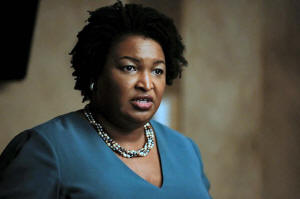|
In Georgia, battle of the 'Staceys' tests
Democrats' future
 Send a link to a friend
Send a link to a friend
 [December 20, 2017]
By Letitia Stein [December 20, 2017]
By Letitia Stein
ATLANTA (Reuters) - The two Democratic
candidates running for governor in Georgia are both lawyers and former
state legislators. Both are women, and on many policy issues it's hard
to tell them apart. Both even share the same first name - Stacey.
But they sharply disagree on the path to victory.
Stacey Abrams, 44, wants to become the first African American female
governor in the United States by mobilizing solidly Democratic black
voters, who vote sporadically in elections, to form a winning coalition
with white liberals.
Stacey Evans, 39, thinks the math does not add up without also appealing
to white moderates, many of them outside urban areas, who voted for
President Donald Trump last November. She is highlighting her crossover
appeal as a white suburban mother with country roots.
Their divergent strategies mirror a wider debate within the Democratic
Party that has grown louder after strong turnout by minority voters
helped to power recent Democratic victories in Alabama and Virginia.

As the party prepares for the 2018 congressional elections, there is
disagreement over which voters to spend more time and money on -
minority voters who are a fast-growing share of the electorate but do
not reliably cast ballots, or blue-collar and suburban whites who swing
between parties. (Graphic: http://tmsnrt.rs/2yYkcHV)
Reuters interviews with liberal activist groups, some donors and an
examination of campaign finance records show that many on the left are
betting on Abrams' strategy as the best shot at turning a Republican
state.
Underscoring the stakes in Georgia is the unusual attention from
national groups seeking to push the party farther left. Their level of
early support for Abrams is largely unparalleled among other 2018
gubernatorial and many congressional races.
A dozen liberal groups have already thrown support behind Abrams,
according to a Reuters tally, even though the Democratic primary, or
nominating contest, is still months away. The breadth of that support
has been little reported.
Abrams, who rouses audiences to near religious fervor describing her
struggles growing up poor and black in the South, argues that Democrats
have wasted resources on swing voters.
"We have left too many voters untouched," she said in an interview,
noting that she refuses to tone down her support for abortion, gay
rights and labor unions to appeal to Republican-leaning voters.
Her opponent does not discount the importance of black voters and also
embraces liberal views. But "you are going to have to persuade some
moderate Republicans to vote for you, if you are going to win in
Georgia," said Evans, who tears up before crowds when she recounts a
childhood spent moving from one rural trailer home to another.

DEMOCRATS REGROUP
After losing the White House last year, the Democratic Party found
itself powerless in Washington. Some in the party faulted their
presidential nominee, Hillary Clinton, for her lack of outreach to
minority voters in key states. Others blamed her inability to connect
with working class white voters who were once Democratic.
Minorities supported the Democratic ticket by wide margins in 2016, but
turnout was flat among Hispanics and sharply lower among African
Americans, according to the Pew Research Center.
Only half of Georgia's black voters cast ballots in 2016, compared to
more than two-thirds of whites, a Reuters review of state records
showed.
The Democratic National Committee said the recent wins in Alabama and
Virginia “show that Democrats are a force to be reckoned with when we
invest early in the communities that represent who we are as a Party."
Jennifer Duffy, a political analyst at the nonpartisan Cook Political
Report, said boosting Democratic turnout could work as a strategy. But
she urged caution - focusing too narrowly on specific demographic groups
risks alienating moderate Democrats. And swing voters, especially in
suburban areas, also played a role in the recent Democratic victories,
she noted.
University of Georgia political science professor Charles Bullock agreed
the numbers are there if Democrats do not lose more white voters.
HOW WE WIN
At the Abrams campaign headquarters, a poster titled "How We Win" points
out that Democrats in Georgia have lost recent elections by some 200,000
votes. More than 1 million black voters did not cast ballots during the
last governor's race in 2014, state data shows.
"They don't vote because we don't ask, and this is a campaign that is
going to keep asking," Abrams said, speaking on a recent evening to an
audience of three dozen volunteers.

[to top of second column]
|

Stacey Abrams, running for the Democratic primary for Georgia's 2018
governor's race, speaks at a Young Democrats of Cobb County meeting
as she campaigns in Cobb County, Georgia, U.S. on November 16, 2017.
REUTERS/Chris Aluka Berry

Abrams, a tax attorney and romance novelist who led Democrats in the
state legislature, said her campaign has already reached out to more
than 300,000 voters with door knocks, phone calls and text messages.
She hosted summer events with music and barbecue in a dozen smaller
cities - places like Macon, a predominately African American
community, and tiny Dalton in the rural northern state.
SOROS PLACES A BET
National liberal activists are lining up endorsements, money and
manpower behind Abrams, who is seen as starting with an advantage in
a Democratic primary dominated by black voters.
Democracy for America, MoveOn Political Action and the Working
Families Party call her campaign a model of how to engage the
nation's increasingly diverse electorate.
"Politics is changing in America, and Abrams' path to victory
reflects the changing demographics and enthusiasm," said Dan Cantor,
national chairman of the Working Families Party.
MoveOn, whose recent endorsement of Abrams marked its first in a
2018 governor's race, said it would mobilize its 125,000 Georgia
members as volunteers for her campaign.
Democracy for America is similarly engaging nearly 35,000 members in
the state. Officials said the group has already raised nearly
$25,000 for Abrams, an unusually high sum for an election still a
year away.

A group called PowerPac is organizing a $10 million get-out-the-vote
effort with plans to hire people to contact minority voters and use
targeted radio, phone and digital campaigns.
Individual donors from outside Georgia have contributed more than
half of the $470,000 in larger donations that Abrams has reported,
according to a Reuters analysis of campaign finance records.
Billionaire George Soros, one of the Democratic Party's biggest
financial backers, and two sons donated $21,000 each.
'AN UTTERLY FALSE CHOICE'
By contrast, Evans is not receiving many donations from outside of
Georgia, nor national endorsements. Her campaign is focused on
restoring cuts to a state college scholarship called HOPE. Most of
her money has come from in-state donors, who have fueled almost all
of her reported $390,000 in major donations.
She has support from Georgia's last Democratic governor, as well as
a big-name Democratic strategist, Paul Begala, who worked for the
governor who created the scholarship.
The Georgia contest reflects divisions between those who want to
broaden the Democratic electorate by bringing back voters who have
shifted away, and those who want to drill deeper into the party's
base to increase turnout, said Begala, calling it "an utterly false
choice."
"It is like a football team saying, 'Do you play offense, or
defense?'" Begala said. "You have to do both."
At a recent barbecue luncheon in Athens, Evans pointed out that she
outperformed Clinton last year in her district by 12 percentage
points, picking up moderate voters.
"You can win in areas where you might not think you are going to
have support, if you show up and talk to people," she told lawyers
lunching on pulled pork served on paper placemats.

Evans is not knocking on voters' doors just yet. But she is
traveling the state talking to local Democratic organizations and
African-American churches.
Lukis Newborn, an undecided rural voter, recently heard Abrams speak
in a suburban Atlanta sports bar. He found her exciting. But he also
connects with Evans, having been raised in a household where dinner
was rice and beans or peanut butter and jelly.
"Both are a part of me," said Newborn, 26, from Paulding County.
"It's an internal struggle of a Georgia Democrat like no other."
(Additional reporting by Grant Smith and Chris Kahn in New York
Editing by Colleen Jenkins and Ross Colvin)
[© 2017 Thomson Reuters. All rights
reserved.]
Copyright 2017 Reuters. All rights reserved. This material may not be published,
broadcast, rewritten or redistributed. |